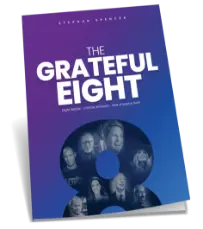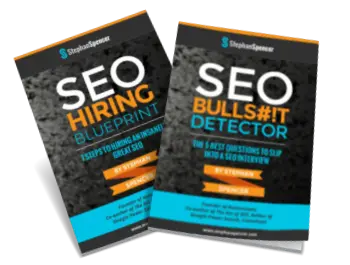SEO Stephan Spencer Author of The Art of SEO: How To Rank Rich Snippets - ASW18
Hey guys, Oscar here for Notagrouch.com. I’m at Affiliate Summit having a great time. And I ran into the SEO god, Stephan Spencer, and he is the author of The Art of SEO. So here’s Stephan Spencer. How are you doing today?
I’m doing great. Good.
Are you having fun at Affiliate Summit?
I sure am.
You had a session yesterday.
I did, yes.
What was that about?
Well, it’s a panel all about SEO, an Ask Me Anything session. Bruce Clay and Duane Forrester were also on the panel. We’ve got some great questions, talked about voice search and featured snippets. We talked about site migrations, e-commerce platforms, and all sorts of stuff.
Do you see a lot of a big shift from, say five years ago to today on how SEO is going?
Well, there are still tried-and-true tactics and strategies that worked back then. But a lot has changed. You know, machine learning is evolving at such a rapid clip that it’s really hard for somebody who’s practicing old-school SEO to keep up.
And with things evolving, like, you know, there’s mobile-first indexing, there are new algorithm updates like FRED, and, you have to worry about being too, ad, intense with, I mean, you’re advertising because you could get hit with the Fred, penalty or algorithm. And with featured snippets being such a big focus, I think folks should really integrate that into their strategy because voice searches, if you think about voice search as, like, we are more likely to be talking to our computers than we are going to be typing on them.
It’s as big of a difference as some members. I don’t know if you can remember this, but when we went from M.S. Dos and, you know, the command line to a graphical user interface, the GUI, yeah, it was life-changing, you know, industry-changing everything, right? So imagine that same scale of Change shift. Yeah.
When you go from a graphical user interface to a linguistic user interface. Sure. So that’s what’s gonna happen. We’re gonna be talking to our computers so much more efficiently, and we’re already seeing that with, you know, talking to Google Home, Cortana, Alexa, Siri, and you know, Alexa, et cetera.
So, you can get ahead of that game by thinking about how to get position zero in Google, which is going to get me visibility in Google Home and Google Now, and so forth. When people talk to Google to get an answer, Google is not going to read off 10 blue links. It’s going to read off the instant answer.
The one that’s the featured snippet and you get more clicks if people are just looking at search results, whether on desktop or mobile; it doesn’t matter. If you want to take that featured snippet, you can steal it from your competitors. We actually talked about this. I’m happy to walk you guys through this.
So, essentially, you’re going to go after the low-hanging fruit. The snippets—well, you need to identify where there already are snippets. Because if you have a keyword that you’re going after, and there’s a map pack there instead of featured snippets, you’re not going to find both. It’s almost never.
So if you’re going after a keyword, that’s unlikely to ever fire up a featured snippet because it’s gonna fire up a map pack instead. Don’t waste your time with that keyword. You need to identify keywords where you actually have a shot at getting the featured snippet. And if there is no featured snippet, you have zero chance because nobody’s going to get it.
So, identify keywords and create a list of them. And how do you do that? Use tools like SEMRush, put in your competitors and say that you want, I don’t know, one competitor has a whole bunch of featured snippets, and you want to steal those featured snippets. Not in an evil way, but just to provide better value. More concise, more accurate, and better answer to the query. In the featured snippet or in a better format.
Let’s say that you’re targeting a keyword that’s like a how-to sort of query. The best format for an answer of that nature would be a list, a numbered list snippet. Okay. So, how do you boil an egg? You type that into Google, and you’ll see a featured snippet that’s 4 or 5. You know, these are the steps for boiling an egg. If it’s a paragraph snippet, that’s a weak snippet. It’s not a very effective answer. So, if you see a paragraph snippet, that’s a weak answer, and you can steal it.
For that type of content?
For that particular search query.
But if it were, say, a bio of somebody, you know, who is Stephan Spencer, then a paragraph would be ideal.
Absolutely.
Okay. So, target contextually the right format.
Yeah.
Yeah. I asked you earlier, off camera, but now I want to ask you here: How much does the actual structure, like using Schema.org, affect the snippets?
It doesn’t.
It doesn’t.
You don’t need to use schema. I always recommend using schema. Schema.org is just a best practice. There’s no reason not to use it unless you’re super lazy and want to do the bare minimum.
Or ignorant of the fact that it exists. If you’re just an expert at this topic and decide to start writing about it, that may be a little too technical for you, but that’s not going to prevent you from being in the snippet.
It won’t, it won’t. In fact, you can even get away with not using the right kind of HTML code. So, ideally, you’re going to use OL and LI tags, which are ordered list tags, if you want a numbered list snippet, right? So that will help you take that featured snippet if it’s an ordered list snippet that you’re trying to take, right?
If you look a lot of times at numbered list snippets, at the HTML behind the scenes on the webpage, it’s actually not OL and LI tags. It’s like regular HTML code. There might be H2s or something for each of those items, and there’s a chunk of text separating out each of those items, and Google’s gone and extracted those headings and built an, like, LI-type list for that featured snippet.
You didn’t even have to put the proper HTML in place. So, ideally, if you want a bulleted list snippet, use UL and LI tags. If you want an ordered list or if you want to go after a numbered list snippet, then use OL and LI tags. If you’re going after a paragraph snippet, and that would be the best answer, just normally write as you would. But for table snippets, you want to use an HTML table.
Okay. Now, something that was, interesting that you just, I want to ask you a little further. You mentioned, for example, that if you write an article and you have six headings on it, you know, H2, Google might just take that and create that list.
Yeah.
So does that mean that we still, I mean, should we still create long format, I mean, long text to give a lot of value to the text? Or should we target answering questions directly in a short answer? I mean.
That’s a great question. So here’s. I think the ideal practice for this sort of situation. So let’s say that you have an FAQ page, and for me, I prefer if I’ve got enough content on that FAQ page to break it up into multiple pages. So, I want to do a deep dive into a particular topic and a particular keyword. And so, let’s say that one of my questions is around in my FAQ, how do you write an effective RFP to hire an SEO? Right? Because I’ve seen some really terrible RFPs come across my desk, you know, because people are asking me to help them with their SEO, and it’s a nightmare.
So that might be a question that I’ve put enough of an answer to together that deserves to be on a separate page. And so that page will rank better, it’ll have a better keyword focus. Around RFPs for SEO projects, et cetera, and I think I’d have a better shot at a featured snippet for that, but what if I had a concise answer kind of like the summer quick summary?
Sure, so I repeat the question. Yeah, I think you want to have the question as well as the answer. So you have the question, you have a concise kind of summary answer Synopsis, and then you’ve got the full deal like I read more, but I wouldn’t use, I wouldn’t do read more, I wouldn’t hide stuff.
Oh, okay.
Because anything that’s hidden, like behind a tab, or a show more, or anything like that, is gonna get discounted.
Oh, okay.
So it’s not gonna get as much weight from Google. You wanna have that visible by default.
Just put it in the same inline, summarize it, and then expand on it.
Yeah.
Okay. That’s pretty good practice for writing anything.
Yeah. And if you’re going to put all that effort into writing a great FAQ, why not take those related questions that relate to particular products or services and put them on those pages as well? That’s going to help with your conversion. So, let’s say that I have a page on SEO consulting, which I do.
So you go to Stephanspencer.com, you click on, you know, work with me, and there’s one of the options: consulting. If I take my best questions and answers from my FAQ pages and then highlight those at the bottom, I Preempt buyer objections. Sure, right. So how much does it cost, Stephan? Like, how long do I need?
How long until I get results? And how many months is there a minimum length of contract with you? Etc. I answer all those, but I don’t copy and paste all of the copy because that’s duplicate content. Instead, I link off to the page with the full answer. I just duplicated the question. And make that a link to the Q& A. That’s, you’re just really making hay that way.
All right. Very interesting. I like the idea that I mean, all the AI and all the new stuff coming up, and the voice search is, you know, that was. You answered my question before I even asked, but I was going to ask what the relative shift in the industry will be once that actually takes place, and it’s going to be huge.
Well, it’s already happening, and what will eventually happen is that the only way to keep up with Google’s AIs is to have your own AIs.
Interesting.
Right? How do you outsmart an AI with another AI?
So, are we eventually going to just be removed from the whole equation, and we’re just going to be consumers?
So, are you talking about the far future? Are we going to become merged with technology, or are you going to be this?
I mean, I’ve been hearing, I’ve been hearing blogging is dead, all this stuff since like 2000. Yeah, everything’s dead, because
It’s all clickbait. Right. SEO is dead. I keep hearing that all the time.
Yeah, but this is the first time I’ve actually considered the possibility that blogging could be dead. I’m just considering all this stuff, and especially the answers you’ve given me. If you get onto the snippet, then people are. Most people are not going to be typing anymore and analyzing ten results or two pages of results.
But they’ll have the content read to them, and there will be videos of their avatar on their personal device that talk them through this concept. So you’ll still provide that amazing content, but it’s not going to necessarily be in the format of being read by me scanning with my eyeballs.
Okay, I guess, I guess. One of our adaptations will be morphing a call to action to take place in that environment.
Yeah, well, it’s not that different from podcasts, right?
Sure.
So, I have to do that. Incorporate calls to action in my podcast. So I have two different shows. I have the Optimize Geek and I have Marketing Speak. Both are excellent shows to which you should subscribe.
We’ll have all the links down in the description.
Yeah, so in a podcast episode, I’m not going to get somebody to fill out a form or take some significant action. At best, I might get them to subscribe because that’s easy. Sure. Sure. Sure. Right, so they’re listening to the episode, and they’re like, in their podcast player, they can hit subscribe, and now they’re gonna get my content on a regular basis.
So it’s not that different from YouTube, right? So you’re not going to get people to sign up for your online course just from watching one YouTube video. You’re going to get them to take one kind of baby stuff. Yeah, progress it, and it’s going to be within that platform, typically like subscribing or watching another video. Yeah, so think about how I can move people forward in the buyer journey and the funnel that makes sense for that particular platform.
As people are having stuff read to them more, such as audiobooks, we’re already seeing that they don’t spend time reading a whole book. They’re just having it read to them from Audible or whatever. So, how do I incorporate a call to action?
Got it. Very interesting. Well, Stephan, thanks a lot. Where can people find you? I mean, I know you talked a little bit about stuff, but give us a list of where to find you.
Yeah, for sure. StephanSpencer.com is my main site, where you can get hundreds of articles that I’ve written over the years. I write for Search Engine Land and a bunch of other places, so there are archived webinars or videos there, all sorts of cool stuff.
I also have two podcasts, Marketing Speak and MarketingSpeak.com. Get all the links and past episodes, the subscribe buttons for Google Play and iTunes, and all that. My other podcast is The Optimized Geek. So optimize geek. com for that one. That’s a biohacking, life-hacking kind of personal development podcast.
It’s not an SEO podcast, even though it sounds like it from the name. And I also have online course multiple online courses available on Stephanspencer. com if you want to do a deep dive into SEL.
I’ve subscribed to a lot of his stuff and it’s amazing. Even the free stuff is better than the paid courses I’ve taken. So, definitely go check him out. Thanks for watching, guys, and we’ll see you next time.


